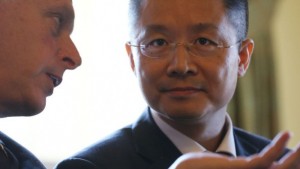By Peter Galuszka
Jim Bacon has a fascinating cover story about the future of Short Pump in the latest Henrico Monthly magazine.
Not to be outdone, I humbly point out that I have a cover story in the Chesterfield Monthly, a sister publication.
I explain how Chesterfield County, the state and other officials landed Shandong Tranlin, an advanced paper mill in the eastern part of Chesterfield. At $2 billion, it’s the biggest Chinese greenfield project ever planned in this country.
The story actually starts when Jerry Peng, a Chinese businessman who happened to go to the Darden School at the University of Virginia, went to the U.S. to look for a place for a new type of paper plant. After becoming frustrated looking on the U.S. West Coast, he plugged his Hoo connections in Virginia and “Project Cavalier” was born.
In less than two years, Virginia and Chesterfield landed the plum. It will employ 2,000 within a few years. It is a story about how county, state and private industry worked quickly and well together. The whirlwind of negotiations credits both former Gov. Robert F. McDonnell, current Gov. Terry McAuliffe and their staff.
The pulp mill is expected to be less polluting because it does not use trees for pulp but uses leftover farmfield waste such as wheat and corn stalk. There is little air pollution because most processes involve steam. There is no extremely toxic dioxin produced because there is no bleaching of paper product. Leftovers are then collected into a “black liquor” that supposedly can be used as a less polluting farm fertilizer which may be used by Virginia farmers that now use polluting fertilizers harmful to the Chesapeake Bay.
It just so happened that Chesterfield had all the right ingredients – proximity to farm field waste; ample highway and rail connections, a large, skilled workforce; deepwater access, lots of process water from the James River and plenty of locally-available power.
It’s is part of a switch in economic policy by the Middle Kingdom. After three decades of drawing in foreign investment, Beijing is now looking for advanced industrial countries. That is why a Chinese firm spent $4 billion to buy Smithfield Foods. Now, there’s Shandong Tranlin.
I do have my doubts about the much-touted environmental benefits of the project, having been to China and seen the enormous industrial pollution there. Air quality in Beijing or Shanghai is routinely many times the highest permissible levels in the West. But plenty of people seem to think that Shandong Tranlin is on to something.
Let’s hope so.
(Note: the Henrico and Chesterfield Monthly are doing some interesting new journalism in the area. Watch for them.)



